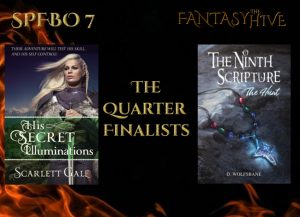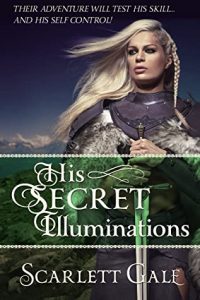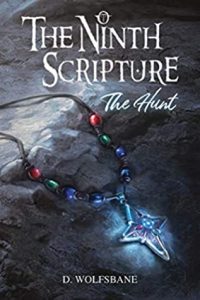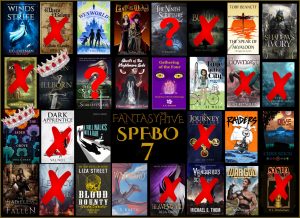SPFBO 7 – The Third Quarter-Final
On Wednesday, we announced our third trio of eliminations and revealed that this week’s two quarter-finalists from the “Leaving Home” batch are HIS SECRET ILLUMINATIONS by Scarlett Gale and THE NINTH SCRIPTURE by D. Wolfsbane.

Of course there are many ways to leave home and many experiences to be had along the way, and again our two quarterfinalists approach this theme in sharply contrasting ways. See the judges’ comments below, with the books – as before – listed in alphabetical order!
His Secret Illuminations
by Scarlett Gale
Theo:

I like the idea of “monastic protagonist taken out of his comfort zone by warrior woman.” The writing is engaging, the set-up subverts the usual gender stereotype of frail woman and mountainous muscled man. Lucian, the monk, is somewhat obsessed with the rarely glimpsed warrior maiden who runs dangerous errands for his abbot. When they are in close proximity to each other there is a kind of insta-love/insta-lust on Lucian’s part which Gale renders quite well. In Heavenward and Downcast (curiously opposing titles I’ve just noticed) the insta-love descriptions felt a bit shallow but Gale finds, for me, a better balance between describing Lucian’s physical/emotional state and Lady She-Wolf’s physical attractiveness. It also helps that he has admired her from afar for a while and she has haunted his dreams, so it doesn’t feel too “insta.” I remember when my private boys school appointed its first female teacher and the kind of impact that had in a closeted male community – a woman, any woman, was a figure of fascination. So Lucian’s feelings towards his companion do feel credible. The world building is also strong, developed through the character interactions with some interesting magical abilities in Lucian. The significance of illuminated manuscripts and the immeasurable value of books when everything is handwritten make for an interesting story starting point. I enjoyed the echoes of the monastic Brother Cadfael mysteries I used to read and I am keen to read on. I do want to see more story of their quest develop alongside what (up to 21% so far) has been mostly scene setting and relationship establishment.
Belle:
Oh this was a delight. I have, once again, read to the end already, but will stick to the beginning for now. It did take me a bit to realise it was romance-with-a-side-of-fantasy, rather than fantasy-with-a-side-of-romance but once I did, I stopped being mildly bothered by the complete irrelevance of the plot, especially during the first 20% – it is not until they leave the monastery that the plot really starts to play a part. I quite enjoy romances, so it is definitely not a criticism, there are different expectations in how a story will progress depending on the “main” genre.
I was absolutely delighted by Lucian, who is a very shy and sweet doof, and the She-Wolf, who is Lucian’s opposite in many ways, and just as sweet in her own way. Others have mentioned the insta-love aspects, but it didn’t feel like that to me – they have known of each other for some time before actually speaking for the first time, and all the meeting-eyes-across-the-room makes their first conversation all the more entertaining.
I also really enjoyed the writing style, and I thought that how Gale handled Lucian’s struggles to maintain his vows and explore all of these new feelings was done very well.
Peter:
This was such an intriguing novel, the writing is engaging and the author switches up a situation in a wonderful way. We follow Lucian, a monk who illuminates manuscripts and who is rather obsessed with the warrior maiden Lady She-Wolf. There is insta-luv situation going on when Lucian is in close proximity to her, it’s well handled as it’s a difficult trope to pull off well. I enjoyed the world-building, this is developed very well through the characters but we also get glimpses of Lucian’s magical abilities. However the first 20% of the novel is all about set up – not a lot really happens and it focuses more on character interaction but it is well written. I think the author’s use of present tense is an interesting touch, it might put some people off this one but I admire the author for trying something different.
Scarlett:
This novel radiates with such beguiling vibes it is utterly charming in some places and a tad bit frustrating in others, simultaneously. Readers on Goodreads have categorized this novel into the romance & fantasy genres mainly, with a few readers also choosing historical, magic, erotica, and LGTBQ genres for it. As the other judges have already mentioned, there are two very lovely main characters with opposing backgrounds. Lucian is a monk in a monastery that took him in as a child, and he illuminates manuscripts based on his faith and purity as a monk. Over time, he has witnessed this warrior woman, Glory the She-Wolf, come and go to the monastery for some business or other. One fateful day in the vegetable garden, they meet somewhat awkwardly, and Lucian gives Glory a tomato. Shortly after, he finds himself without any personal belongings, contracted by Glory, to accompany her on a mission to find and retrieve stolen manuscripts. This is the moment in the novel where the reader realizes the characters’ main differences most. Glory is a very large human, albeit pretty charming and worldly, but Lucian is perfectly on that other spectrum, small, shy, very devout, and now terribly flustered (internally) about the female presence so near him. Long story short, the constant tension of the forbidden is sort of the main premise in the first 20% of the novel and that alone creates the perfect invite for some readers. I hope that there will be more to this novel with the main character being a warrior woman, which implies that action sequences should be in this storyline’s future, and the conundrum of Lucian’s illumination magic hinging on his devout purity that would provide further substance of the plot to chew on while reading. However, I enjoy these sort of historical settings and have become somewhat fond of the characters, to my surprise. To me, the writing and story flow were skilfully carried out and speak of experience. The right readership will enjoy this very much, I think.
If I was a romance connoisseur, it would have me reading all night long to finish it. Perhaps, more focalization on magic, action, and intriguing plot points minus the romance will do the trick when reading on.
Calvin:
There was a lot that I liked in this one. The story beats begin with monks who illuminate manuscripts, certainly a unique starting place amongst the fantasy novels I’ve read. Into this all-male world of monks steps a mercenary woman who has a history of working with the monastery. I think I might disagree a little with Theo, as I don’t really find the attraction between the two main characters to be of the insta-love variety. Lucian has watched her from afar and, as Theo mentions, a woman entering an all-male environment is certain to draw a sort of mysterious fascination. I’m one who tends to bounce off insta-love stories pretty hard, but this one simply didn’t have that feel to it. Having said that, there were moments when I wasn’t quite certain why the two MCs were attracted to each other, outside of a certain mystery that the two represent to each other. There are some hints of magic in the first 20% that I hope receive more attention in the remainder of the novel. For me, there are two strikes against the novel. The first is the rather thin plot throughout the first 20%. It’s basically entirely setup and relationship building, with very little plot. The second strike is that it’s written in present tense, and I have a very strong preference against present tense. Having said that, I am intrigued enough to read more.
The Ninth Scripture
by D. Wolfsbane
Theo:
 It has an interesting mix of magic (talent) and technology (cars, guns and hovercrafts) which is reminiscent of The Sword of Kaigen (SPFBO5 winner). However, there is also a lot of familiarity to the setup, orphaned strange looking outsider is taken to magical school and turns out to be a bit of a prodigy. However, attracts adverse attention from the dominant bullying clique and makes enemies amongst the teachers which makes her time difficult. Disputes are settled by challenges (reminiscent of The Combat Codes, SPFBO6 finalist) and there is a strange world specific game which resembles indoor tennis, dodgeball and football, but with an accepted level of violence that would make an MMA fighter blush. (anyone for Quidditch?).
It has an interesting mix of magic (talent) and technology (cars, guns and hovercrafts) which is reminiscent of The Sword of Kaigen (SPFBO5 winner). However, there is also a lot of familiarity to the setup, orphaned strange looking outsider is taken to magical school and turns out to be a bit of a prodigy. However, attracts adverse attention from the dominant bullying clique and makes enemies amongst the teachers which makes her time difficult. Disputes are settled by challenges (reminiscent of The Combat Codes, SPFBO6 finalist) and there is a strange world specific game which resembles indoor tennis, dodgeball and football, but with an accepted level of violence that would make an MMA fighter blush. (anyone for Quidditch?).
The techno side of things and the whole setup involving an ongoing war between Gutarro and Naresti is a bit different. The war aspect feels a bit like the perpetual conflict in Orwell’s 1984, and the world is more threatening and less benign than Harry Potter’s Ministry of Magic. The prose hasn’t soared for me yet, there are quite a few narrative/expository sections just filling in how our protagonist Zecaar is getting along, which feel quite telly rather than showy. While that may be an attempt to be brief and efficient in passing on those details, – you sort of wonder if the details needed passing on at all. So overall, I’m curious but not invested in this story,
Belle:
This is one of only a few quarter finalists that I haven’t read the whole way through. The worldbuilding is interesting, with the mix of fantasy and sci-fi, and the magic system is intriguing based on what we know so far, but some of the descriptions wavered between unnecessary and info dumps.
I feel a bit over the “chosen one orphan” trope, so I’ll be very interested to see how that’s handled once Zecaar is around others with the same (albeit lesser) talents. I did like the relationships shown between the orphans, and it was a bit disappointing to see Zecaar pulled away from her friends.
I wasn’t completely sold on this one, but I find myself a bit curious to see how or if my opinion changes after reading on a bit further.
Peter:
I was very interested to read this book, the dystopian/techno feel to the story was intriguing. We follow a female protagonist called Zecaar, who is in an orphanage with others and awaiting her time. You discover that Zeccar has “The Talent”, a well created magic system which is one the best parts of the book, I am really curious to see how it all works. The book holds a lot of promise, but there are some exposition sections filling in how Zeccar is which felt quite random and I wondered if they were needed at all. There are also some interesting attempts to draw an emotional response during the book, but I did enjoy the dynamics between the orphans and while the book felt a bit YA I also found quite a few things falling into place and I would be very interested in reading on.
Scarlett:
This novel is the third instalment of The Ninth Scripture trilogy and it has a bit of a dystopian/techno YA feel to me as we have seen in popular books adapted to movies. The main female protagonist Zecaar is in the South Wing orphanage with other girls “awaiting” their time. Through propaganda, they are drilled to understand that their call to duty is duly the part of procreation in honour to help the nation bring up more soldiers and as the oldest, Zecaar knows it will be any day now. Dreams of war and the abandonment by her parents mixed with memories of home, fuel her allure and nightmares in equal measure. The fate of boys on the other hand would come through the so-called “sacrifice” by suicide missions handed to them. However, it turns out that Zecaar has “The Talent” and that changes everything for her future.
In terms of setting, and some of the layers of “The Talent” magic, which I have to learn more about, it feels overall intriguing and interesting to me. The story also started on quite an exciting note and as a reader who doesn’t always pick up on tropes, I did pick up on them here. I found the character dynamics of the novel among the orphans etc lively and engaging, albeit with YA undercurrents. Generally I’m not a fan of such kinds of reads, but some things did fall into place for me here and I hope it can keep my interest locked in when reading further.
Calvin:
This one surprised me quite a bit. Reading the back-of-the-book blurb, this didn’t strike me as one that I’d be super interested in. Yet I found myself intrigued by the world building in particular. We’re treated to a futuristic world, where the magic system involves telepathy and telekinesis. I love unique magic systems, and so I’m definitely interested in this one. There is also an element of questioning the philosophical underpinnings of a forever war, which I find incredibly relevant in our present global context. Zecaar, the main character, is also well-fleshed out and I found her to be engaging and relatable, at least as far in as I’ve read to date. Having said that, there are certainly plenty of tropes in this one. The main character is a prodigy, goes to a magical school where students are divided into teams (*cough*houses*cough*), and there is a special game that’s a sort of mash-up of racketball and boxing(?). There are also hints of young romance. It’s a YA novel, and unashamedly so. I don’t know what the rest of the novel holds, obviously, but I’m intrigued enough at 20% that I don’t want to stop reading.
And our chosen semi-finalist is…
Oh no … this quarter-final is going to EXTRA-TIME!
The judges weren’t confident, after 20% of each book, about separating these two into a semi-finalist and a quarter-finalist. So we are going to read on a bit more and see which one lives up best to its early promise, before deciding which of them will get the coveted semi-finalist and full read accolade.
You’ll have to wait for the outcome of this quarter-final until we come back to it in an “end of phase one play-off” in mid-September. (Hopefully we won’t have to resort to a “one page read at a time” penalty shootout!)
So congratulations to D. Wolfsbane and Scarlett Gale for still being in the competition and
commiserations to D. Wolfsbane and Scarlett Gale for still being in limbo about their quarter-final outcome.

Akeyo, Emmanuel – The Tears of the Old Gods
Bapaye, Rebecca – Legacy of Flame (*quarter-finalist)
Barbuzano, Israel – The Last of the Wicked
Bennett, A. E. – Gathering of the Four
Bennett, Toby – The Spear of Akvaloon
Deen, Anela – In the Jaded Grove (*semi-finalist)
Gale, Scarlett – His Secret Illuminations (* quarter-finalist ET)
Gibbs, Olga – Heavenward
Greylock, T L & O’Connor, Bryce – Shadows of Ivory
Gutman, U. G. – Winds of Strife
Holt, Jason A. – The Klindrel Invasion
Jackson, Daniel T. – Illborn (*semi-finalist)
Kaelen, Scott – The Nameless and the Fallen
Kaeth, S. – Windward
Kinnaman, V. L. – Sasha of the Feral Sons: Adolescence
Lumsden, Douglas – A Troll Walks into a Bar: A Noir Urban Fantasy Novel
Lyness, C. A. – Raiders (The Dying Light Saga)
Maltman, Amy – A Journey Unveiled
Marquitz, Tim – War God Rising
Mickley, Rebecca – Ghosts of the Nightmare Gods
Montgomery, Drew – The Burial
Neil, Val – Dark Apprentice
Preston, T. R. – Wenworld
Reign, Chris – Dive: Endless Skies
Reynolds, Cait – Downcast (*quarter-finalist)
Street, Liza – Blood Bounty
Thom, Michael E. – The Vanguards of Scion
Wills, KE – Faye in the City
Wolfsbane, D. – The Ninth Scripture (*quarter-finalist ET)
Woods, Willow – Where I Belong

[…] Week 3 ‘Leaving Home’: Meet the Batch | Eliminations | Quarter-finals […]